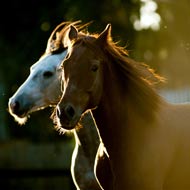Discovery could lead to improved stem cell therapy

Whilst the human endometrium is known to harbour stem cells, this is the first time they have been obtained from the equine uterus.
A new discovery could reduce pain and stress in horses undergoing stem cell therapy, according to a team of scientists who managed to harvest stem cells from the equine uterus for the first time.
Stem cells are used therapeutically in horses with tendon and joint injuries, but they are usually obtained surgically from bone marrow or fat tissue. However, stem cells can be taken from the uterus, without the need for surgical intervention, using small instruments inserted via the cervix.
Scientists from Vetmeduni Vienna collected uterine tissue samples from six mares. Suspected stem cells were separated from the endometrial epithelial cells and expanded in cell culture. Various molecular biology techniques were then used to identify potential stem cells.
The cells clearly expressed the same markers as bone marrow stem cells, according to the research team. They were also able to show that the endometrial stem cells differentiated into fat, bone, cartilage and muscle cell lines.
Whilst the human endometrium is known to harbour stem cells, this is the first time they have been obtained from the equine uterus.
“The endometrium provides a source of mesenchymal stem cells that can be easily accessed with little stress to the animals,” said senior researcher Christine Aurich.
“The cell culture results show that these cells can be of benefit not only in the treatment of uterine conditions, but that they can also replace the need for surgically obtained stem cells for therapeutic purposes in other tissue types.”
The full results have been published in the journal Stem Cell Research and Therapy.



 The Federation of Independent Veterinary Practices (FIVP) has announced a third season of its podcast, Practice Matters.
The Federation of Independent Veterinary Practices (FIVP) has announced a third season of its podcast, Practice Matters.